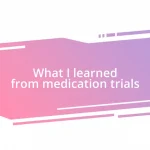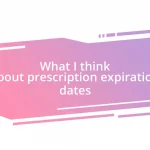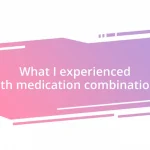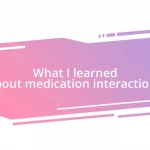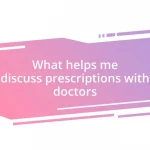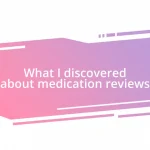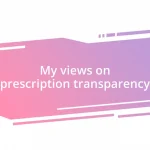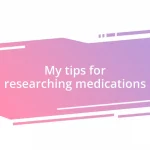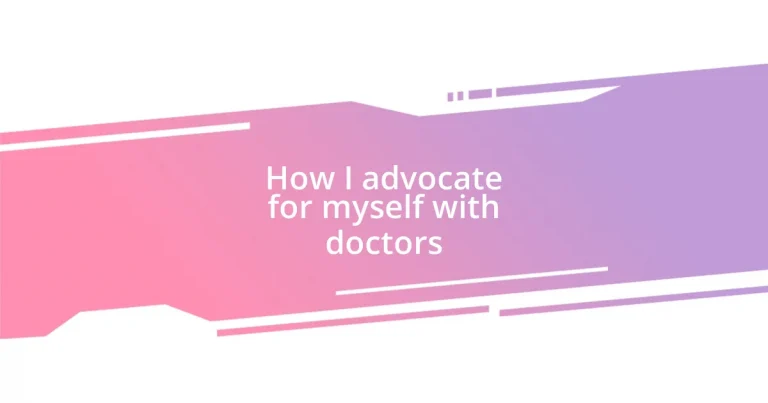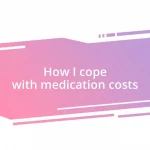Key takeaways:
- Effective self-advocacy with doctors involves preparing questions and discussing concerns openly to foster a collaborative relationship.
- Asking the right questions, particularly open-ended ones, encourages detailed discussions and empowers patients in their healthcare decisions.
- Following up after appointments strengthens communication with healthcare providers and enhances involvement in one’s care journey.
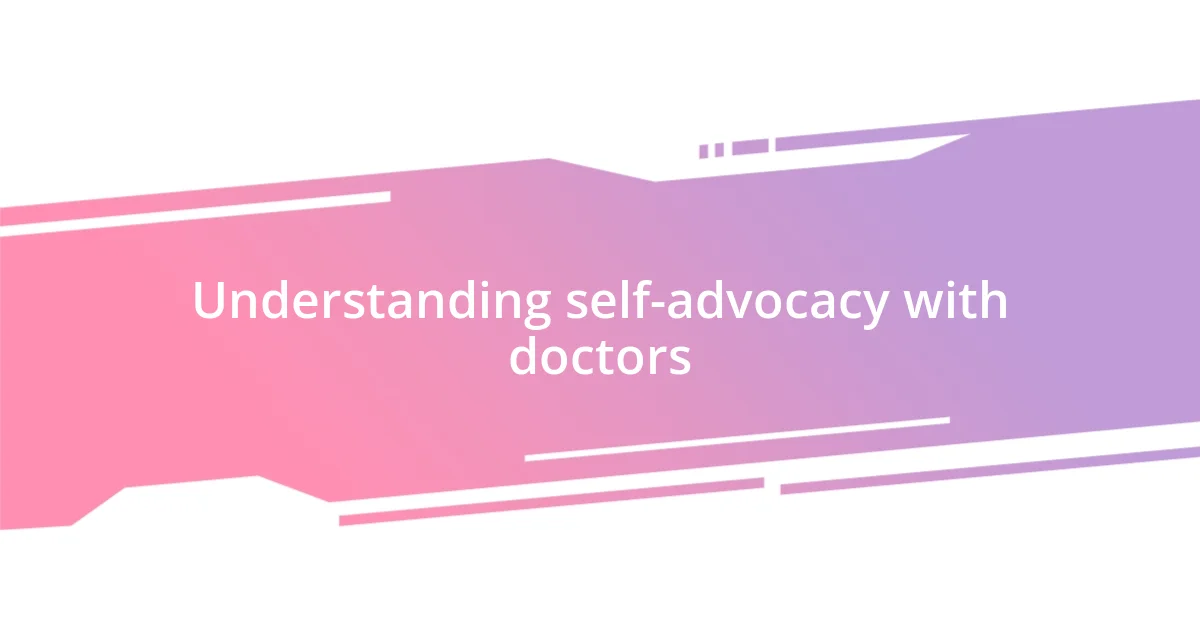
Understanding self-advocacy with doctors
Self-advocacy with doctors is about more than just speaking up; it’s about building a partnership. I remember sitting in a doctor’s office, feeling overwhelmed by medical jargon. Suddenly, I realized I could ask them to explain terms I didn’t understand. It transformed the way I interacted with healthcare providers.
Thinking about self-advocacy makes me wonder: how many of us leave appointments still unsure about our treatment plans? I’ve been there. There was a time I didn’t fully grasp what my doctor was recommending, so after the appointment, I made a point to write down my questions and call the office. That proactive step made me feel empowered, and it also compelled my doctor to communicate more clearly in our next meeting.
I have learned that sharing my feelings during consultations can break down barriers. For instance, I expressed my anxiety about a particular treatment, which led to a more tailored approach. When you share your concerns, you’re not just an anonymous patient; you become an active participant in your care, and that’s where true advocacy begins.
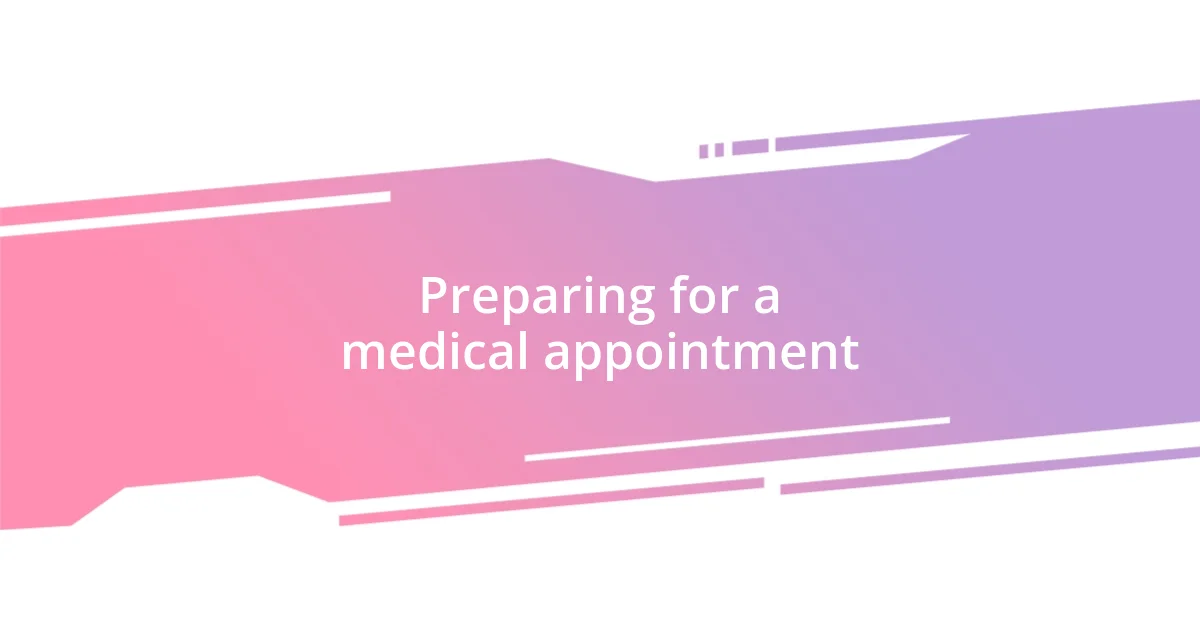
Preparing for a medical appointment
Preparing for a medical appointment can feel daunting, but I’ve found that a little prep work can make a world of difference. I always take some time beforehand to jot down what I want to discuss. It helps me stay focused during the appointment and ensures I don’t forget anything important. One time, I walked in with a list of symptoms I’d been experiencing, which led to a more productive conversation with my doctor.
Here’s a quick checklist to help you prepare for your next visit:
- Write down your symptoms, including when they started and how they affect your daily life.
- List any medications you are currently taking, along with their dosages.
- Note any previous treatments or approaches that didn’t work for you.
- Prepare specific questions about your condition or treatment options.
- Bring any relevant medical history, including family health issues that might be pertinent.
Taking these steps not only boosts my confidence but also signals to my doctor that I’m engaged and invested in my health. Every time I leave an appointment feeling heard, I realize just how impactful this preparation can be.
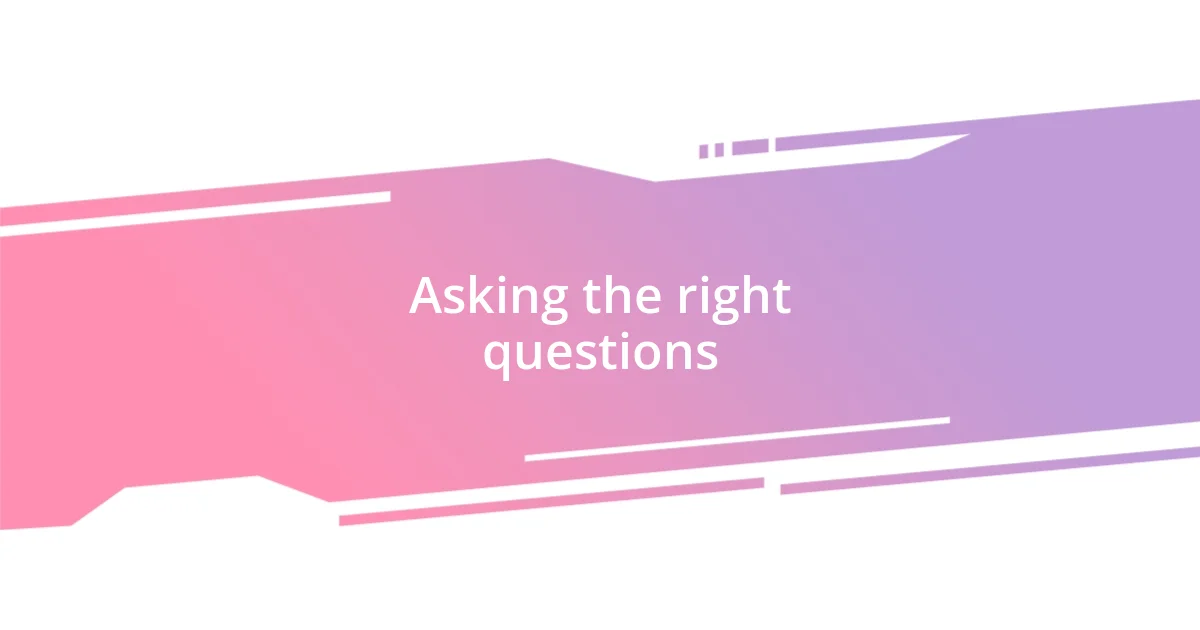
Asking the right questions
Asking the right questions is vital in any medical encounter. I recall a time when I felt hesitant to question a treatment plan that seemed vague. Gathering my courage, I asked my doctor for clarification about the expected outcomes and side effects. That simple act opened the door to a detailed discussion, helping me feel more secure about my choices.
When I think about good questions to ask, I often remind myself that it’s about being curious, not confrontational. For example, asking “What are my alternatives?” can shed light on options I might not have considered. This not only empowers me but also prompts my physician to think beyond the usual script, leading to a more informative dialogue and a better understanding of my treatment landscape.
Different types of questions serve different purposes, and I personally find that open-ended questions lead to richer conversations. Instead of asking just whether a certain medication is effective, I might ask, “How do you believe this will impact my daily life?” This has changed the way my healthcare provider interacts with me—my concerns are taken seriously, and I leave feeling like a team member rather than just a patient.
| Type of Question | Purpose |
|---|---|
| Open-ended | Encourages detailed responses and discussion |
| Closed-ended | Gathering specific yes/no information |
| Clarifying | Ensures understanding and clears up confusion |
| Follow-up | Explores ideas further based on previous answers |
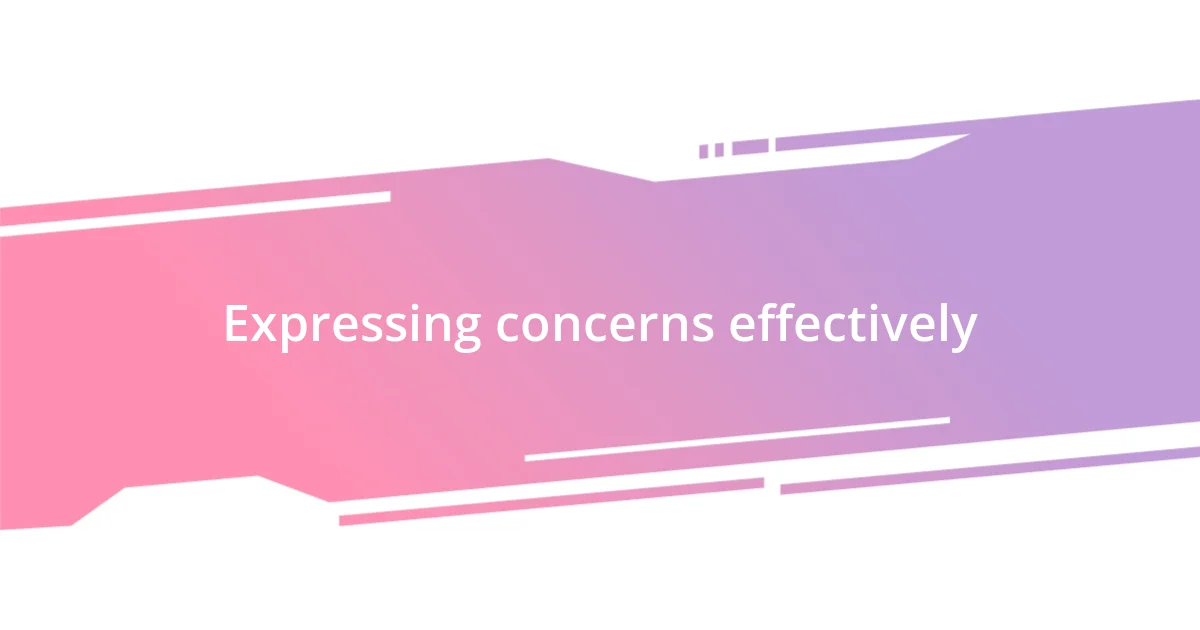
Expressing concerns effectively
Expressing concerns effectively is about striking the right balance between clarity and emotion. I remember sitting in a doctor’s office, anxiety buzzing in my chest, as I prepared to voice my worries. It’s one thing to write down your concerns, but it’s another to convey them in a way that truly captures how you feel. I learned that practicing what I wanted to say in front of a mirror helped me articulate my thoughts, making sure my feelings were heard but also respected.
I always approach this conversation with self-compassion. Once, when discussing side effects from a medication, I gently told my doctor, “I’m really struggling with this. It’s impacting my mood and my life.” Surprisingly, this honesty allowed my doctor to listen more intently. It reinforced that vulnerability is not a weakness; it allows for deeper connections and a more tailored response that addresses both my physical and emotional health.
Another technique I use is to focus on “I” statements. When I express concerns by saying, “I feel overwhelmed when I experience these symptoms,” it opens the door for dialogue without sounding accusatory. This approach invites the doctor to see my perspective and fosters an environment where my concerns are valued, leading to a collaborative solution. Have you ever shared your feelings with a healthcare provider and noticed a shift in their response? I genuinely believe that when we share our feelings, we transform the nature of the conversation, paving the way for genuine understanding and better care.
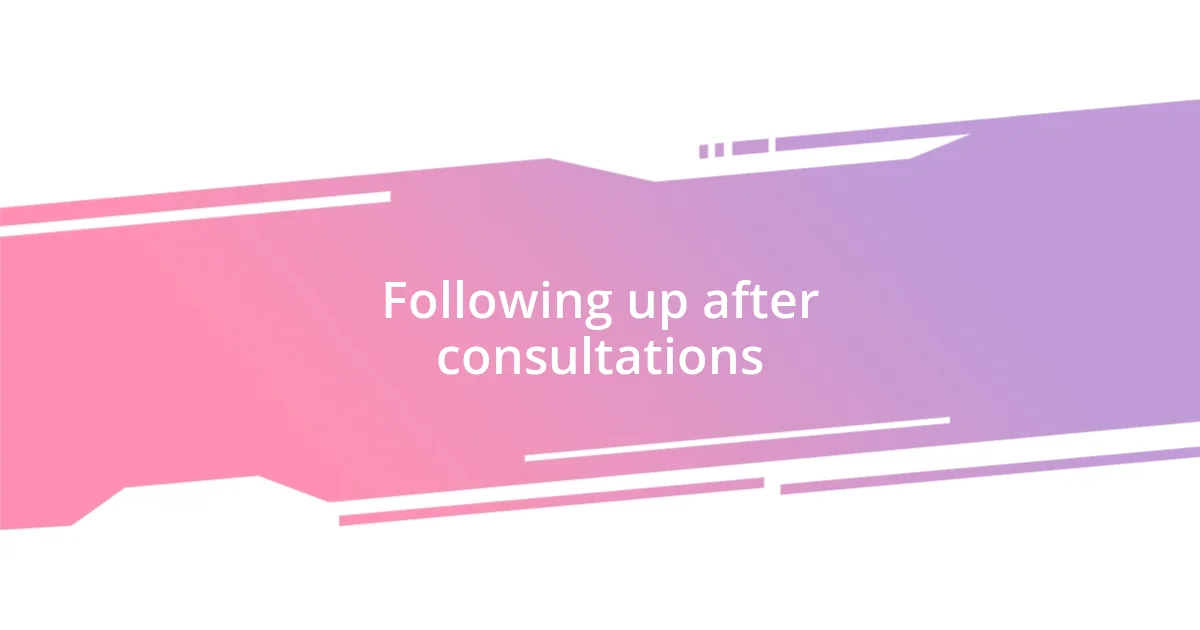
Following up after consultations
Following up after a consultation can feel daunting, but I’ve found it immensely beneficial. After my last appointment, I took a moment to jot down the key points discussed. This simple act not only helped me remember what was said but also clarified any lingering questions I had. The next day, I reached out via email, summarizing my thoughts and asking specific questions about the next steps. It felt rewarding to take that proactive approach, and my doctor responded with detailed information that made me feel involved in my care.
In my experience, timing is essential when it comes to follow-ups. I usually aim to connect within a couple of days after the appointment, while everything is still fresh in my mind. One memorable instance was when I followed up on some test results. I felt a mix of apprehension and excitement, but reaching out for clarity provided me with peace of mind. It’s incredible how a quick phone call or email can transform uncertainty into understanding and foster a stronger relationship with my healthcare provider.
Another key insight I’ve gained is to embrace the follow-up process as a partnership rather than a chore. I often remind myself that my health journey is collaborative. When I reached out about my medication adjustments after feeling unwell, I was both nervous and hopeful. To my relief, my doctor was eager to discuss alternatives and adjustments. It reinforced the idea that following up doesn’t just benefit me—it keeps the lines of communication open, ensuring that my healthcare team has the right information to help me thrive. Have you ever tried following up after an appointment, and noticed how it changed the dynamic of your relationship with your doctor?
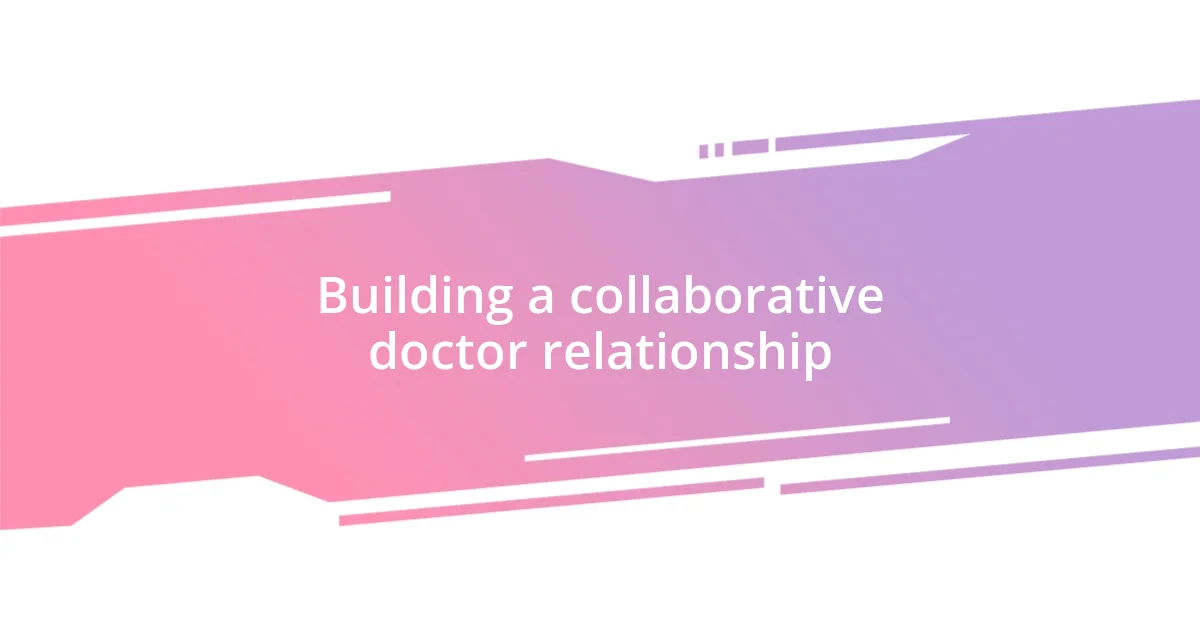
Building a collaborative doctor relationship
Building a collaborative relationship with my doctor requires both openness and trust. I remember the first time I walked into a new healthcare office. Initially, I felt a wave of apprehension. However, as I introduced myself and shared my health history, I noticed the doctor’s demeanor change. The more I disclosed, the more engaged he became, which made me realize that sharing personal insights fosters a partnership. Have you ever felt that shift when you openly shared your story with someone?
I also learned the importance of aligning expectations with my doctor. During one visit, I felt overwhelmed by the multitude of choices before me regarding treatment options. Instead of remaining silent, I said, “I’m feeling lost with all these options. Can we break this down together?” This simple question transformed my experience. It turned what could have been a directive encounter into a shared decision-making process, where my concerns shaped the next steps. Isn’t it comforting to know that your voice can actively guide your care?
Another pivotal moment occurred when I began to ask my doctor for feedback on my self-management strategies. I vividly recall discussing a recent attempt I made to manage my symptoms through lifestyle changes. When I asked, “Do you believe these changes are making a real difference?” the discussion deepened. My doctor not only validated my efforts but also offered tailored advice that reinforced the collaborative nature of our relationship. It’s moments like these that remind me of the power of our partnership in the journey toward better health. How do you think frank discussions impact your relationship with your healthcare provider?


